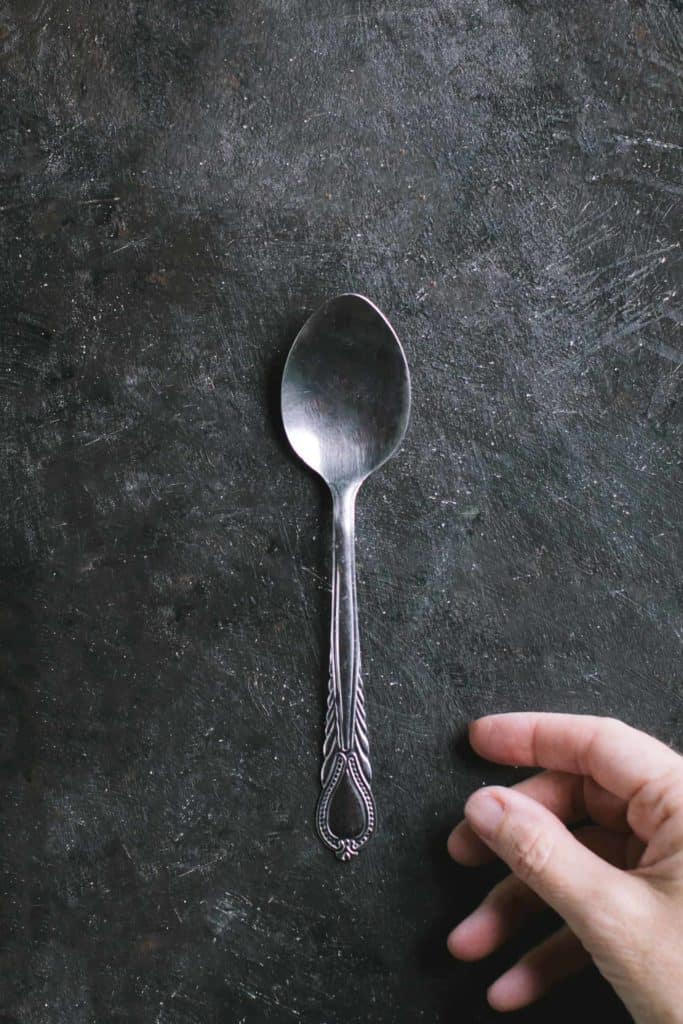
On one of my visits to the Catholic Charities of the Rio Grande Valley Humanitarian Respite Center, I took a huge pan of arroz con pollo (chicken with rice) to the volunteers, as well as a pot of beans.
At that moment, the Humanitarian Respite Center was at its old location, a small former evangelical church in a strip mall on the west side of downtown. The kitchen was cramped and crazy, and people were running in and out of the kitchen with Styrofoam bowls of soup for the migrants. I knew it would be pandemonium, but I brought my arroz con pollo anyway. People have to eat, and I thought after serving soup all day, the volunteers might want something else. The volunteers had little time to eat lunch but in the delirium of a crisis, a few paused a moment to eat and reenergize.
While I was washing dishes back home and scrubbing the pans that I had taken with me, I found a spoon that I didn’t recognize. It wasn’t mine. It was a utensil from the Humanitarian Respite Center. I brought it home accidently, and I thought I could return it on my next visit. But as of this writing, it is still in my utensil drawer, and it makes me think every time I see it.
The spoon is very poor quality – a shallow bowl with an embossed handle, an old baroque European scroll type design. The stamped metal is so thin that it cuts both sides of your mouth while you are eating.
There are two ways of looking at this spoon – unworthy or unassuming. My family has casually grabbed it for use for eating yogurt, or serving salsa, but I quietly remove it from our table, and put it back in the drawer. Is this spoon not good enough for us? Is it too cheap and mean for my family?
Perhaps that is one way of looking at the spoon.
Over time, it changed from a simple utilitarian spoon into a contemplation. It represents the suffering of someone else. How many people who have been smuggled, coerced or forced from their home have used this spoon? Quite a few.
So this is not the spoon to use for a yogurt snack, or serving salsa. It is the spoon that must stay in the utensil drawer, next to my heavy French cutlery. It is the spoon that must remind me that I unquestionably have something to eat every time we set the table for a meal.
Instead of serving food, the spoon serves as a reminder three times every day of how fortunate I am, and how unfortunate others can be. The spoon serves to remind me that I can help.
Three times a day we can all be reminded of what it means to be human.
Catching a glimpse of this mean little soup spoon is my wordless way of saying grace, a reminder that there are those less fortunate that could use some kindness.
After so many weeks of living with it, I don’t believe I will return the spoon. I would miss it too much. I think there is a reason it stayed in my pan of arroz con pollo. It was meant to be found so it would challenge me forever.
I am going to keep the spoon, but I will give back other things.

Thank you for this wonderful spoon story. This is my first time visiting your post. I love the polvorón recipe. My mother would make a “pan dulce” that was rolled into a circle and then she would slice the dough on the diagonal to create triangles. It was dry but very tasty. I was wondering if you have a similar recipe? We are from Eagle Pass but relocated to Wisconsin in 1955-maybe she was adapting the recipe to what was at hand. Thanks so much-looking forward to purchasing your cookbooks.
Thank you Josefina! I wonder what that type of cookie looks like? I don’t know of any regional cookie that is sliced on the diagonal, but now I am curious! I apprecaite you taking the time to read my blog, I hope you have a wonderful holiday season!
Again, beautiful. Happy Holidays.
Thanks so much Kim! More soon! Hope you have a great holiday season!
Thank you for your very nicely written and meaningful post. As a home cook the symbol of the spoon is even more memorable. I think I will reframe something in my kitchen.
Thank you Chris! I will be posting more soon. I appreciate you taking the time to read my post! Hugs!
Hi! I’m Robin from El Paso. I love your spoon and what it symbolizes. I’ve seen several of your posts and your hands always caught my eye. I wondered how many meals those hands have made. I feel that food nurtures not only the body but the spirit. You’ve inspired me to make a meal and give it to someone who needs nurturing. Thank you.
Hi Robin! Thanks so much for your kind words! There are plenty of things your hands can do in El Paso, so much going on in border towns right now. Its a little overwhelming, but we have to be part of our community, no matter what. Bless you durinng this holiday season, and again, very grateful for your sweet note. Hugs!!
MG